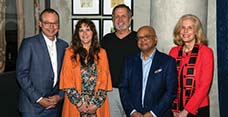Positive Impact on Patients

A transformative gift from the Potocsnak family has established the Potocsnak Center for Undiagnosed and Rare Disorders at Vanderbilt University Medical Center.
The center will allow VUMC to accelerate research and serve more patients looking for answers and cures to diseases that, in some cases, have been undiagnosed for decades.
“I am incredibly grateful to the Potocsnak family for this important gift. Already, VUMC is recognized as a national leader in using advanced genomic methods, such as BioVU, to identify undiagnosed diseases. The Potocsnaks’ support will allow Dr. Rizwan Hamid and his talented team to take their work to the next level in scale and impact,” said Jeff Balser, MD, PhD, President and Chief Executive Officer of VUMC and Dean of Vanderbilt University School of Medicine. “This remarkable act of generosity, enabling us to create this center, will impact countless lives.”
Over the years, John Potocsnak, through the Potocsnak Family Foundation, has supported countless nonprofit initiatives. The family’s involvement with VUMC, from philanthropy to advocacy, is led by a commitment to others and their own patient experience. Their impact on health care at VUMC includes their support of vision research and leaders at the Vanderbilt Eye Institute. John’s daughter, Liz Potocsnak, is a longtime member and now chair of the Vanderbilt Eye Institute Advisory Board. This latest gift to create a center will change patients’ lives with undiagnosed diseases.
“Hearing about those who have reached out to Dr. Rizwan Hamid’s lab for answers and seeing VUMC’s unwavering commitment to these families was incredibly moving. We wanted to do something for people who may otherwise be forgotten, and it was clear that VUMC has both the passion and ability to do so,” said Liz Potocsnak. “It’s our privilege to be part of the solution as the center furthers this wholehearted investment for as many patients as possible both in Tennessee and across the world through information sharing.”
According to the National Institutes of Health, an estimated 30 million people in the United States have rare diseases, and as many as 1 in 10 are without a diagnosis. An undiagnosed disease can be a rare or newly described condition or a rare presentation of a more common disease. Between 70 and 80% of undiagnosed diseases are due to rare genetic disorders.
As a world leader in the use of big data and genetic information to inform patient care, VUMC is optimally positioned to lead significant advances in the diagnosis and treatment of these patients, said Rizwan Hamid, MD, PhD, Dorothy O. Wells Professor of Pediatrics and director of Pediatric Medical Genetics and Genomic Medicine. Hamid is also the new center’s director, serving children and adults as a collaborative effort that crosses many disciplines at VUMC.
“It’s an amazing gift that has the potential to help a group of patients with rare and undiagnosed disorders who have no other recourse or no other source for help,” Hamid said.
VUMC is an original member of the NIH Undiagnosed Diseases Network, established in 2014. In 2021, the Vanderbilt Undiagnosed Diseases Program was launched to operate alongside the NIH program to expand services to many more patients living with the consequences of an undiagnosed disease.
The Potocsnak Center for Undiagnosed and Rare Disorders makes a significantly larger impact possible for patients everywhere well into the future through the development of a robust program emphasizing collaboration, patient-centered care, innovation and training.
“The establishment of the center dovetails with our institutional goal of precision medicine,” Hamid said. “Trying to identify someone’s rare disorder is precision medicine at the cutting edge. The vision for the center is to help these patients by leveraging the current best clinical care and state-of-the-art research. Our promise to the patient and family is that an undiagnosed disease case is never closed.
“That sort of approach is very achievable at VUMC because of the immense collaborative spirit that permeates every aspect of our organization, from the president’s office to the lab technician working hard to decode a genomic sequence.”
The center will use a multipronged approach to grow the current undiagnosed diseases program. Plans include expanding the team dedicated to this cause, increasing the capacity for clinical analysis of genomic data, introducing new higher-resolution genome-decoding technologies, and working to improve patient access.
“Our family’s ethos is ‘helping people who help people,’” said John Potocsnak. “We are driven by wanting to make a difference and to inspire others to do the same. By creating this center, our purpose is to help as many individuals as possible who have run out of options and need a tireless partner in their corner through VUMC’s expertise and unique approach.”
